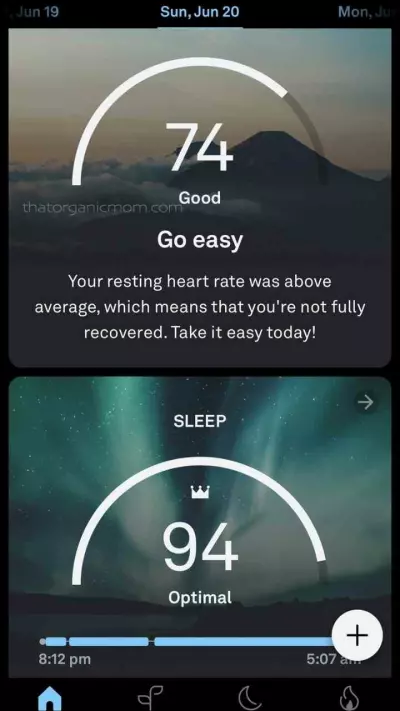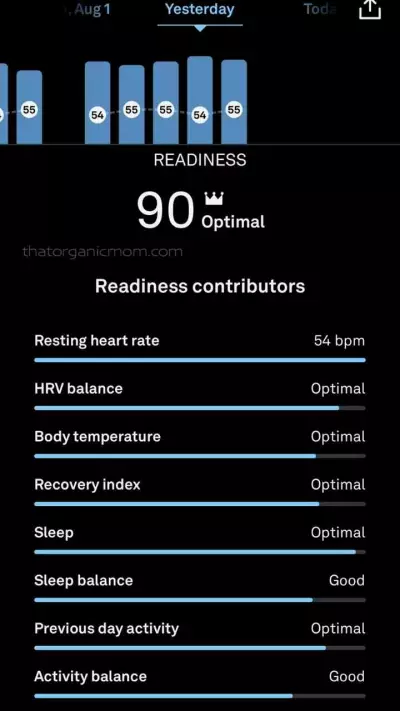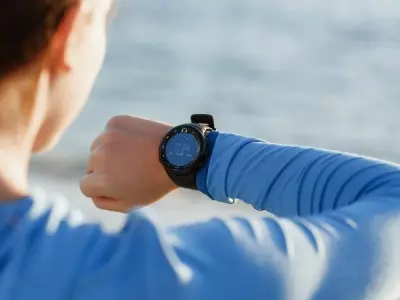Last Updated on June 29, 2022 by Rebecca Huff
Why would you want to learn how to improve HRV and what exactly does it represent?
HRV, or heart rate variability is the measurement of time between heartbeats in milliseconds. While it might seem like a “steady heartbeat” is best, the truth is we need variation.
If you've ever had an EKG you may have seen these periods of time called “RR intervals” on your results. RR intervals on an EKG indicate the time elapsed between two successive R-waves. These indicate the ability of the cardiovascular system to cope with environmental challenges.
Heart Rate Variability is linked to your autonomic nervous system which regulates the workings of your body that you don't have to think about. These include breathing, blood pressure, and heartbeat.
Within the autonomic nervous system, there are two divisions.
- Parasympathetic Nervous System (rest and digest – deactivation)
- Sympathetic Nervous System (fight or flight – activation)
HRV Score
Heart Rate Variability is the balance between these two systems. Another way to think of it is that the parasympathetic slows the heartbeat and the sympathetic increases. When your body responds well to both you end up with a higher HRV. So in this case, higher numbers are better.
High HRV numbers show that your body will perform well and can adapt quickly. Low HRV is an indication that one system is dominating the other. During aerobic activities, your sympathetic nervous system will expend energies towards that activity so its signals will be stronger. There are other times these two systems can be out of balance such as an illness or overtraining.
That is why it is best not to eat right before you go to bed, your body will be in recovery mode during sleep. Eating late means that your body will have to divert some energies towards digestion and away from restoration.
If you are recovering from an illness, have inflammation, or if you've been working too hard and experiencing too much stress. This will be reflected in HRV values and is an indication that you need to rest and recover.
Discovering and Monitoring Your Heart Rate Variability
Some doctors may have an EKG machine they use to perform a routine assessment, but it is not the norm. (I have a story I'll share in the Healthologist Community about a doctor I went to one time who had a machine that he didn't know how to use properly – that man gave us quite the scare!) Endurance athletes often use a chest strap or other heart rate monitor as a tool for monitoring improvement and even detecting arrhythmias. (1)
For my 50th birthday, my daughters gifted me an Oura ring. Slipping it on my finger, I went about my daily life while it tracked and measured things like my activity levels and how well I slept. The first couple of weeks establishes a baseline for your personal averages in the areas of activity, sleep, rest, and recovery.
The app on my phone told me that I was getting around 94-98 for sleep efficiency. That didn't surprise me since I make it a point to practice good sleep hygiene on a regular basis.
What did catch me off guard was the score I got for HRV, although it shouldn't have been a surprise considering my iron levels were low due to menorrhagia over the last few years. In addition, I've had low cortisol (and accompanying adrenal fatigue) on and off for years.
Because of a particularly challenging month, I was not able to do much exercise. I could see that reflected in my numbers. Even though I hadn't been exercising my heart rate was higher than normal for me, because of low iron. This is another benefit of knowing these numbers, if your HRV indicates you need recovery time you can explore the reasons why.

There are other ways to discover what your HRV is, such as the Whoop wrist device monitor which is more affordable than the Oura ring.
Can You Improve Heart Rate Variability
First, note that it is most important not to worry about comparing your HRV to others. There are so many metrics involved in your baseline HRV that it is best to focus on your personal scores.
With that said, you can learn how to improve your HRV with time and attention to a few areas. There are some factors that contribute to your HRV that are completely out of your control. These are:
- age
- gender
- illness
- hormones
The good news is, there are also factors that you can control. This is what you want to focus on.
- physical fitness
- sleep quality and quantity
- hydration
- medication
- caffeine and alcohol consumption
- stress (You can lower stress or manage it better. You can add good stressors such as sitting in an infrared sauna, cold showers, high-intensity interval training, sleeping on a chilipad, etc.)
The easiest way to figure out where you are and what to do about it is to monitor and find your average HRV.
How to Improve HRV
As with most things in life, it is better to focus on what we can change than what we have no control over. (If anyone figures out how to change age, share that info with the rest of us!) Taking my HRV measurements I could see that there was room for improvement.
Although, knowing some of the downward fluctuations correlate to health issues I had to forgo strenuous exercise for the short term. Therefore, I focused on my mental health, staying hydrated, being consistent with my sleep and wake times, and following my usual healthy diet. I used the healthy stressor of sitting in my sauna as well.
Once my iron levels were back up in the normal range, I reintroduced exercise. Starting with yoga, then challenging myself with more strenuous exercise. Overtraining can lead to a lower HRV, as I discovered when I pushed myself too hard without factoring in enough recovery time.

Here are other ways I worked at improving my HRV
Tips for longevity tend to correlate to higher HRV, so following tips meant to extend healthspan will improve your numbers.
- Stay Active – Reduce the amount of time you spend inactive. If you work at a desk, make sure to get up and move around every hour. Even standing up to do a few jumping jacks or squats will do the trick.
- Contrast Therapy or Hot and Cold therapy – Going from hot to cold is especially good Warm-up using exercise, sauna, or even a hot shower, followed by a cold shower. Standing in a cold shower with the water hitting the back of your neck, where the vagus nerve is located.
- Improve sleep quality. A consistent sleep schedule is the best and easiest thing you can do to improve your HRV. Going to bed and getting up at the same time every day, even on weekends, helps your circadian rhythm. If you have trouble with this, make sure to get in the sunlight early in the day, and again in the afternoon when you start to feel drowsy.
- Follow a healthy diet. More vegetables and even intermittent fasting can help to improve your overall health. Don't eat late in the day, avoid overeating, and pass on processed foods.
- Practice mindfulness and deep breathing. Your resting heart rate will improve as you learn to manage stress, not to mention your quality of life! Good mental health is a pillar to your well-being, and managing stress is key. When I feel stressed I practice deep breathing. Inhale for a slow count to seven, hold for a count of seven, then exhale to a count of seven. As you breathe deeply, it sends a message to your brain to calm down and relax. I also do this sometimes when I can't go back to sleep and it works every time.
Bottom Line:
Wellness is all about the daily practice of healthy habits to achieve better physical and mental health. As I often tell my children, it's good to be aware of how the choices we make and the things we do impact our health and wellness.
While it is good to practice these healthy habits, it's best not to let them stress you out. If you're so caught up in practicing healthy habits that you miss out on quality of life, then what's the point?
Yes, I often monitor and tweak things like HRV because I enjoy doing that and love learning how the body works and what improvements can be made. Monitoring is a good way to make small adjustments to your already healthy lifestyle. It can also be a reminder that you need to focus on rest and recovery.
If you're the kind of person that gets preoccupied with these numbers or you've experienced Orthorexia, talk with your health care provider before monitoring or adjusting. It is so easy to get caught up in perfection and lose sight of the big picture.
Want to chat more about health and wellness? Join the Healthologist Community for free. That's where we share and discuss health topics like this every day.
Sources
1 Gajda, R, Biernacka, EK, Drygas, W. Are heart rate monitors valuable tools for diagnosing arrhythmias in endurance athletes? Scand J Med Sci Sports. 2018; 28: 496– 516. https://doi.org/10.1111/sms.12917


 Tips for Longevity from The Habit Society
Tips for Longevity from The Habit Society